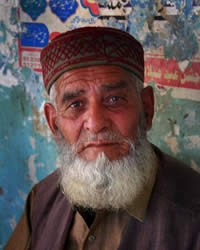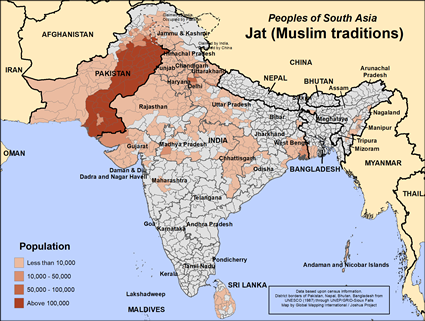Jat (Muslim traditions) in Pakistan

Photo Source:
Steve Evans - Flickr
Creative Commons
|

Map Source:
People Group data: Omid. Map geography: UNESCO / GMI. Map Design: Joshua Project.
|
| People Name: | Jat (Muslim traditions) |
| Country: | Pakistan |
| 10/40 Window: | Yes |
| Population: | 17,607,000 |
| World Population: | 19,096,000 |
| Primary Language: | Saraiki |
| Primary Religion: | Islam |
| Christian Adherents: | 0.00 % |
| Evangelicals: | 0.00 % |
| Scripture: | New Testament |
| Ministry Resources: | Yes |
| Jesus Film: | Yes |
| Audio Recordings: | Yes |
| People Cluster: | South Asia Muslim - Jat |
| Affinity Bloc: | South Asian Peoples |
| Progress Level: |
|
Introduction / History
The Jat people are a historical Indo-Aryan tribal group native to the Punjab region.
The Jats rose to prominence following the 1669 Jat uprising against Mughal rule, and they ruled various princely states throughout the 18th century. After 1858, under the British Raj, the Jats were known for their service in the Indian Army, being categorized as a "martial race" by the British, specifically in the Jat Regiment, the Punjab Regiment and the Sikh Regiment.
It is not known when the Jat people established themselves in the Indian desert. By the 4th century they had spread to the Punjab.
The life and culture of Jats is full of diversity and approaches most closely to that ascribed to the traditional Central Asian colonists of South Asia. The Jat lifestyle was designed to foster a martial spirit. Whenever they lost their kingdoms, Jat people retired to the countryside and became landed barons and the landlords with their swords girded round their waists. They would draw the sword out of the scabbard at the command of their panchayat to fight with the invaders.
What Are Their Lives Like?
Jat people have a history of being brave and ready fighters. They are fiercely independent in character and value their self-respect more than anything, which is why they offered heavy resistance against any foreign force that treated them unjustly. They are known for their pride, bravery and readiness to sacrifice their lives in battle for their people and kinsmen. In the government of their villages, they appear much more democratic. They have less reverence for hereditary right and a preference for elected headmen.
The Jat people are required to marry within their community. The joint family system was popular amongst the Jats and large families use to share the same house and hearth. With the advancement of modern civilization, as people are becoming less dependent upon and less tolerant towards each other, the joint family system is going out of vogue. It was still prevalent in the less advanced areas in the 1930s. The Jats are required to marry within their religious community. Divorce is uncommon, possibly because it leads to serious conflict between the husband and the wife s families. Widow marriage is not only permitted and practiced but is also a social obligation.
Gender based abortions are common in Jat communities; they prefer sons over daughters. Their sons are much more likely to get an education than their daughters.
What Are Their Beliefs?
The Jats make up followers of three major religions: Hinduism, Islam and Sikhism. Today there is a small group of adherents to Christianity, especially Jats living in the in UK. Most Jat communities in Pakistan are Muslim. Like most Muslims in South Asia, they include certain Hindu practices with their Islamic practices.
What Are Their Needs?
Muslim Jats need the humility it takes to enter the Kingdom of God like a child.
Prayer Points
Pray for the Muslim Jat people in Pakistan to understand and embrace that Jesus wants to bless their families and neighborhoods.
Pray for Holy Spirit anointed believers from the Muslim Jat people to change their society from within.
Pray for a movement in which the Holy Spirit leads and empowers Jat disciples to make more disciples.